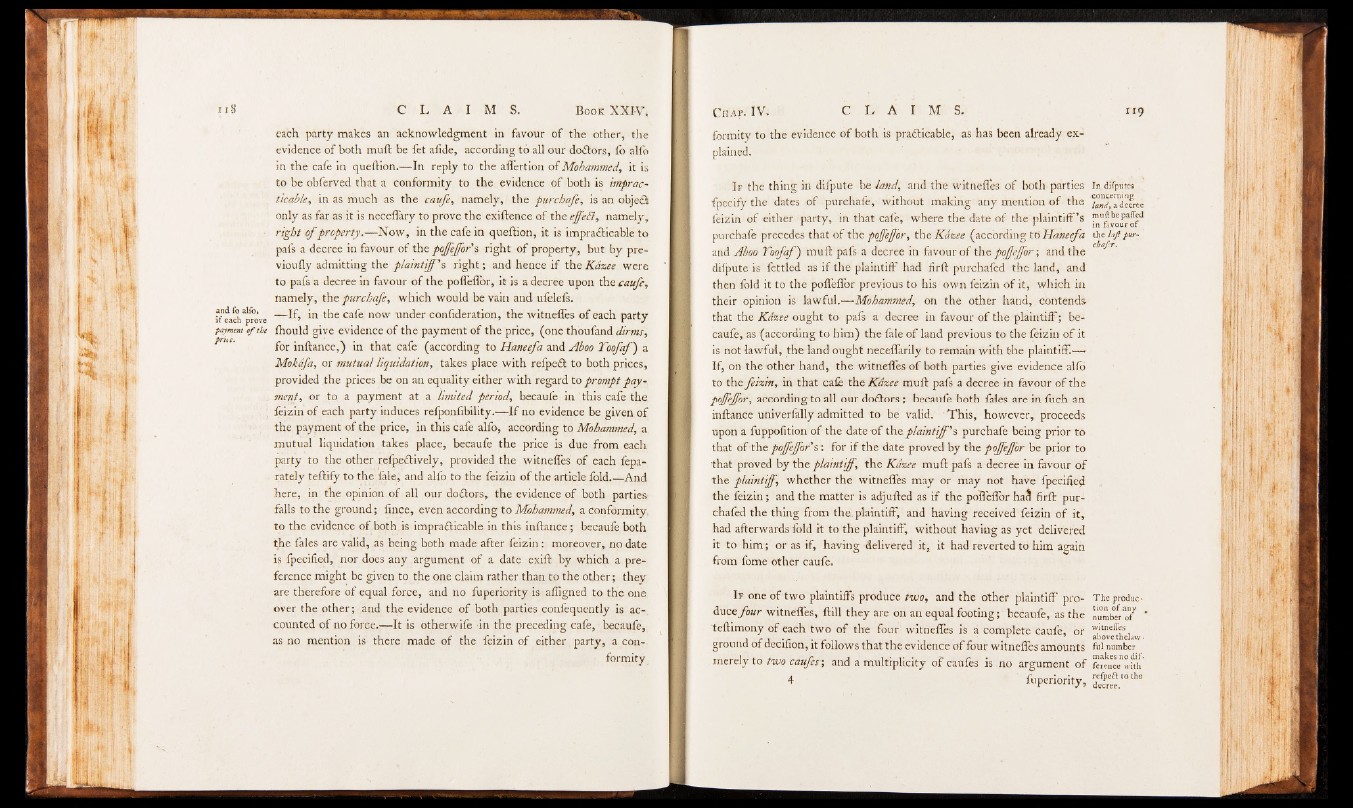
WM
each party makes an acknowledgment in favour of the other, the
evidence of both muft be fet afide, according to all our doctors, fo alfo
in the cafe in queftion.— In reply to the aflertion of Mohammed, it is
to be obferved that a conformity to the evidence of both is impracticable,
in as much as the caufe, namely, the purchafe, is an object
only as far as it is neceflary to prove the exiftence of the effetl, namely,
right o f property.-rN ow , in the cafe in queftion, it is impracticable to
pafs a decree in favour of the poffeffor's right of property, but by pre-
vioufly admitting the plaintiff's right; and hence if the Kdzee were
to pafs a decree in favour of the pofleflor, it is a decree upon the caufe,
namely, the purchafe, which would be vain and ufelefs.
ffeach^rove — *n t^ie ca^e 110 w under confideration, the witnefles of each party
payment of the fhould give evidence of the payment of the price, (one thoufand dirms,
for inftance,) in that cafe (according to Haneefa and Aboo Toofaf) a
Mokafa, or mutual liquidation, takes place with refpeCt to both prices,
provided the prices be on an equality either with regard to prompt payment,
or to a payment at a limited period, becaufe in this cafe the
feizin of each party induces refponfibility.— I f no evidence be given of
the payment of the price, in this cafe alfo, according to Mohammed, a
mutual liquidation takes place, becaufe the price is due from each
party to the other refpeflively, provided the witnefles of each feparately
teftify to the fale, and alfo to the feizin of the article fold._And
here, in the opinion of all our doctors, the evidence of both parties
falls to the ground; lince, even according to Mohammed, a conformity,
to the evidence of both is impracticable in this inftance; becaufe both
the fales are valid, as being both made after feizin: moreover, no date
is fpecified, nor does any argument of a date exift by which a preference
might be given to the one claim rather than to the other; they
are therefore of equal force, and no fuperiority is afligned to the one
over the other; and the evidence of both parties confequently is accounted
of no force.— It is otherwife in the preceding cafe, becaufe,
as no mention is there made of the feizin of either party, a conformity
formity to the evidence of both is practicable, as has been already explained.
I f the thing in difpute be land, and the witnefles of both parties
fpecify the dates of purchafe, without making any mention of the
feizin of either party, in that cafe, where the date of the plaintiff’s
purchafe precedes that of the poffeffor, the Kazee (according VS Haneefa
and Aboo Toofaf) muft pafs a decree in favour of the. poffeffor \ and the
difpute is fettled as if the plaintiff had firft purchafed the land, and
then fold it to the pofleflor previous to his own feizin of it, which in
their opinion is lawful.— Mohammed, on the other hand, contends
that the Kdzee ought to pafs a decree in favour of the plaintiff; becaufe,
as (according to him) the fale of land previous to the feizin of it
is not lawful, the land ought neceflarily to remain with t-he plaintiff.—
If, on the other hand, the witnefles of both parties give evidence alfo
to the feizin, in that cafe the Kdzee muft pafs a decree in favour of the
poffeffor, according to all our doctors; becaufe both fales are in fuch an
inftance univerfally admitted to be valid. This, however, proceeds
upon a fuppofition of the date of the. p laintiff's purchafe being prior to
that of the poffeffor's: for if the date proved by the pojjeffor be prior to
that proved by the plaintiff, the Kdzee muft pafs a decree in favour of
the plaintiff, whether the witnefles may or may not have fpecified
the feizin; and the matter is adjufted as if the pofleflor had firft purchafed
the thing from the plaintiff, and having received feizin o f it,
had afterwards fold it to the plaintiff, without having as yet delivered
it to him ; or as if, having delivered it, it had reverted to him again
from feme other caufe.
If one of two plaintiffs produce two, and the other plaintiff pro-
3ucsfour witnefles, ftill they are on an equal footing; becaufe, as the
teftimony of each two of the four witnefles is a complete caufe, or
ground of decifion, it follows that the evidence of four witnefles amounts
merely to two caufes; and a multiplicity of caufes is no argument of
4 fuperiority,
In difpute«
■ concerning
land, a decree
muft be pafled
in favour o f
the laß pur-
chafer.
T h e prbduc-
tion o f any
number of
witnefles
above thelaw -
ful number
makes no d ifference
with
refpeft to the
decree.